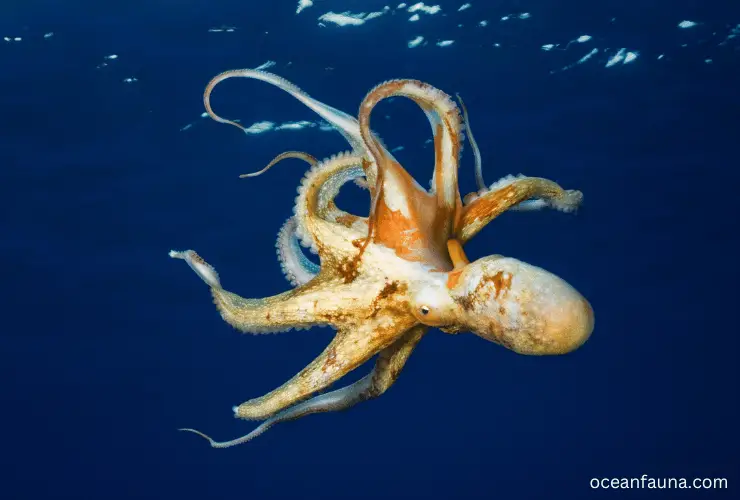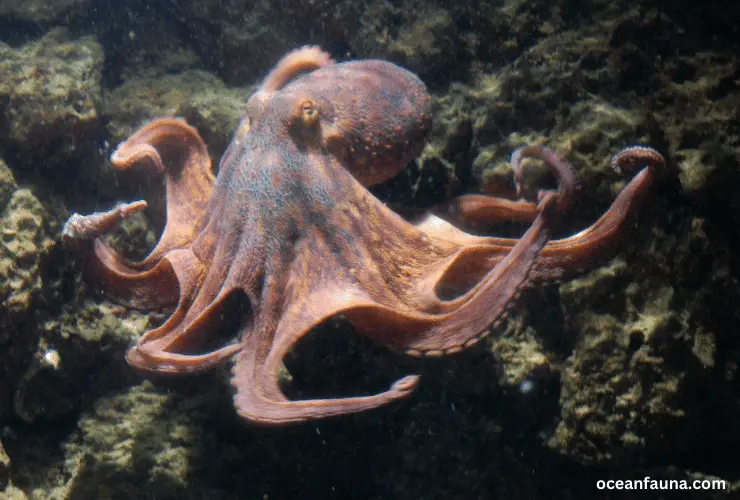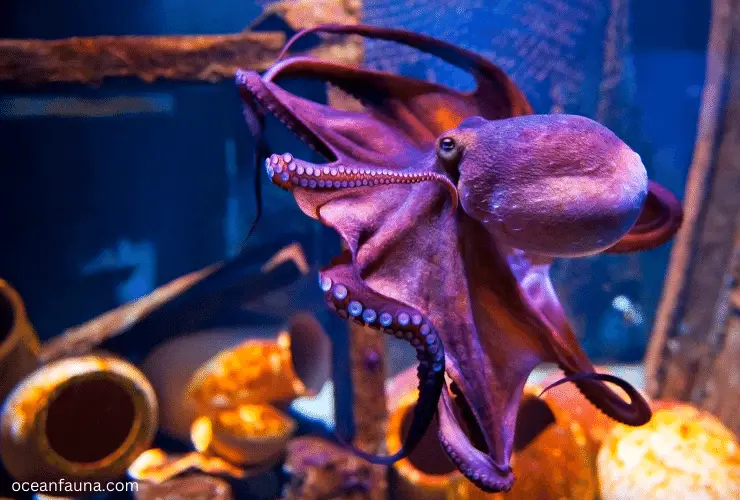Octopuses are very intelligent creatures of different sizes and live in different locations. That means they got such wide varieties and uniqueness in their lifestyles. Among their lifestyle, the most questionable fact is their food habit. As they can eat almost anything, people get confused easily.
But in this article, we’ll focus specifically on the topic ‘Do octopuses eat fish’. Yes, they do. According to their physical structure, they can attack any other prey, but fish is the easy one. However, do they prefer small or big fish will depend on the size of the octopus?
It shows how versatile octopuses are! This also indicates there’s a lot to know about their food habit. And that’s what we’re going to unfold in this article. So, let’s walk with us to learn the detailed food habit of an octopus.
Do Octopus Eat Fish?
Octopuses do eat fish. And small fishes are one of the favourite foods of the baby octopus. Moreover, fish are not as strong as the attacking octopus. That’s why it’s easier to catch fish.
Besides, an octopus has eight tentacles with a suction cup on each arm. This helps them grab their prey quickly and pull it into their mouth.

And as soon as they pull the prey, they inject venom into the prey’s body. So, it’s difficult for any fish to survive that.
However, they do prefer fish with shells. It’s easier to break the shell and eat the food.
How Much Fish Do Octopus Eat?
Octopus has a jelly-like body. And most of their body contains this gelatinous flesh. That’s the reason they require a lot of protein to be healthy and for a constant growth.
So, there’s no surprise that they need a good amount of food daily to grow. But the amount will depend on their size and what food is available around them.
They need food at least 2% to 4% of their body weight. And most of the portion comes from the fish.
Octopuses are extremely perceptive creatures that deliberately seek out poorly defended prey. And that’s the reason why they include fish in their diet.
What Fish Does Octopus Eat?
Basically, octopuses will eat almost anything that comes their way. And they won’t even hesitate to eat double their size prey if there’s a lack of food. However, what fish an octopus will eat will highly depend on its size.
But the common ones are a wide range of small fish, including shrimp, crabs, snails, and other sea stars. The larger octopus will try to prey on the bigger fish. For example, the Giant Pacific Octopus can even eat octopus.
How Does Octopus Taste Fish?
We, humans, taste our food with the help of tongues. But it’s not the same for an octopus. They have built a very unique and peculiar way of tasting.
To taste their food, they have to touch the food with their arm. Moreover, the suction cup on their arms has millions of sensory endings. These sensors allow them to taste their food by touching it.
However, we humans taste food that gives us gratification from what we taste. But for octopuses, it’s different because they can identify what they are eating only by tasting.
And one more interesting fact is that they don’t have any taste sensors in their mouth. But if anything makes its way to their mouth, they’ll definitely eat it.
Some Common Foods of An Octopus
Apart from fish, there is some other common food on an octopus diet. Here are they:
Plankton and Small Sea Mollusks
Plankton is one of the favourite food of baby octopuses. They are very small in size (only a few inches), so they can’t attack bigger prey. Moreover, plankton and sea mollusks are enriched minerals that are enough for the baby octopus’ growth. For example, Dumbo octopus mainly feeds on mollusks.
Nevertheless, they are easy to prey on due to their defenceless behaviour. They live in coastal areas and deep waters.
Crabs, Mussels, And Clams
Though fish comes first in their food choice, crabs, mussels, and clams are the typical diets of an octopus. Basically, middle and bigger size octopuses attack crabs. Crabs have strong shells that protect themselves from predators. However, the octopus targets these crabs and breaks their shells with its strong beak.
Mussels and clams also have shells but are not as strong as crabs. To paralyze their prey, they use their venomous saliva. As a result, they can’t move. Further, this is when octopuses pull them into their mouths. Moreover, food becomes softer due to saliva.
Lobsters
These are big, so they are perfect for bigger octopuses. And they were found at the bottom of the sea.
Lobsters are another beautiful marine creature with strong shells and soft flesh inside. They are rich in minerals. They also have big claws in front of their head.
An octopus catches a lobster with their long tentacles. And after catching the lobster, they immediately inject venom like previous. Then they break the shells and pull the soft flesh into their mouth.
Squid
Their biggest enemy is octopuses. Squid has eight arms and two longer tentacles. These organs of their body are specifically made to protect them from predators.
But squid has a very soft fleshy body. That’s why it’s easier for octopuses to attack them. That’s why as soon as an octopus finds a squid, it’ll bite it and inject venom. Therefore, they stop moving.
Additionally, the intestines of an octopus are equipped with the enzymes needed to break down the skeleton of its prey.
Other Octopuses
Fundamentally, the giant or bigger octopus can eat other baby or small-sized octopuses. Octopuses are born with a predator nature. That’s why if a bigger octopus can’t find anything to eat, it might attack other small octopuses. This process is known as cannibalism.
This may come as a shock, but it is very normal in the world of octopuses. Additionally, female octopuses have been observed eating male octopuses.
How Do Octopus Catch Fish?
Octopuses live in dens, and they catch their prey by surprising them. And by the time the prey recovers from the surprises, the long tentacles of an octopus grab them.
They hold the fish or prey with the suction cup. It’s simply impossible for any fish to escape that sticky and strong suction.
If the octopus has a good grip on its victim, it may easily drag it into its mouth and devour it. They make their life simpler by injecting the fish with their poison to immobilize it.
Sometimes they even inject venom into the prey even before consuming them. Especially if they see any potential for defensive behaviour in the prey. For example, crabs, lobsters, etc.
The venom turns the fish’s flesh into jelly, making it easy to extract from its shell.
And that is how they catch the fish. It’s a pretty straightforward process. But without the help of their tentacles and venom, it would be tough.
Factors That Affect an Octopus’s Diet
The surroundings of an octopus really affect its diet. So, let’s find out what the factors are!
Size
Octopuses are found in three different sizes. They are small, middle, and larger. According to the sizes, their diet varies. Let’s see what varieties they show in the diet.
- Small Octopuses
Baby octopuses are merely born with a few millimeters. At that very initial stage of their life, they can’t hunt the bigger size prey.
So they totally live on plankton. But as they grew, they moved from nanoplankton to microplankton and meroplankton. Along with plankton, they also eat gastropods and other marine mollusks.
- Middle Octopus
These octopuses live in shallow water. That’s why they eat whatever is found around them. Vulgaris octopus is one of them.
- Larger Octopus
These octopuses grow to several feet, like the Giant Pacific Octopus. As they are big in size, they try to attack bigger prey like lobsters, squid and shelled sea mollusks.
Location
There are 300 species of octopuses around the world. And it is found that they can only survive in their immediate environment. That means they’ll eat the food that is available in their location.
Type
You’ll find two types of octopuses. They are shallow-wtaer ocotpuses and deep-sea finned octopuses.
Fish, snails, and crabs are common food of shallow water octopuses. On the other hand, shrimp, lobster, and big-sized prey are for deep-sea octopuses.
Does Octopus Eat Snacks?
Though octopuses’ diets change depending on the readily available types of prey, there are a few staples that they never stray from. That is to say; they won’t suddenly adopt a vegetarian diet. Like some fish, they won’t consume anything that has been crushed up.

Evidence from observations of octopuses in the wild suggests that they form “taste” profiles of the foods they eat. Instinct may be at the root of this “store” of knowledge. It has also been theorized that this ability will mature and grow as the octopus lives and learns to hunt other prey species.
Do Octopuses Become Choosy When It Comes to Food?
There is no such evidence that octopuses are peaky eaters. Otherwise, they won’t survive in the competitive environment of the sea.
But some researchers observe that particular species of octopus do show favoritism. However, this happens in a very rare situation.
To be specific, this is a common scenario when the place is full of prey. In that case, octopuses do take time to choose their favourite food or prey.
But octopuses live in very close proximity. It’s uncommon to behave like a choosy eater because it can affect their predator’s strategy. At that very moment, they have to catch the prey that is available around them. They won’t even hesitate twice to do so!
That means they can be selective sometimes but not to the extent that harms their hunger.
However, there are other exceptions too. For example, if you remove an octopus from its natural habitat, it will show some differences. It will happen more when they are placed in captivity, which we’ll discuss later in this article.
Relation Between Octopus Appetite and Captivity
As already said, when an octopus lives in captivity, that affects its appetite. If someone handles this captivity inappropriately, then the octopus will feel hesitation.
Sometimes they might stop eating due to their hesitation. And this could continue until they feel safe and secure in the new place.
However, some octopus owners spread rumors about this state of an octopus. Whereas in reality, it’s pretty simple. This could happen to any pet.
That’s why you must handle an octopus with more care and affection in captivity. By doing so, they can survive captivity without any eating problems. Moreover, as fast as you help an octopus reduce stress, it will recover faster.
Besides, octopuses never show signs of being picky eaters if you train them to live in permanent residence tanks that are both spacious and well-stocked with secure hiding spots.
Moreover, you can’t keep octopus and other fishes in the same tank because octopus will eat other fishes. What you can do instead, you can feed an octopus daily like the natural habitat. Also, they prefer live food over frozen food.
FAQs
What Kinds of Foods Can Kill an Octopus?
Although octopuses can’t be poisoned by anything found in nature, salt is commonly used to kill them. It can kill an octopus by pouring salt into its cerebral bag.
Does the Octopus eat Herring?
While herring are forage fish that like to swim in shallower waters, octopuses prefer the deeper waters of the sea and the vast oceans. However, if an octopus finds a herring, it will even eat that.
Is it true that octopuses eat sharks?
Octopuses like prey that is smaller than themselves. However, they have been reported have been reports of them killing sharks and dolphins for sustenance. Octopuses are large and powerful, so while they do not kill sharks very often, it is not impossible.
Verdict
Do octopuses eat fish? If you have read so far, you know the answer. Fish is one of the common and easy prey of octopuses. They will eat a wide range of fish according to their sizes and availability.
Till now, you know that targeting fish is easy compared to other prey due to their defenceless nature. And on top of that, Octopuses are born with such a physical structure that helps them easily hunt fish and other prey.
Hopefully, this article teaches you why octopuses eat fish and how the process works.
So, thanks for taking the time to read this article, and if you got any questions, please ask in the comment section.


2 thoughts on “Do Octopus Eat Fish? [Octopus Food Habit Explained]”